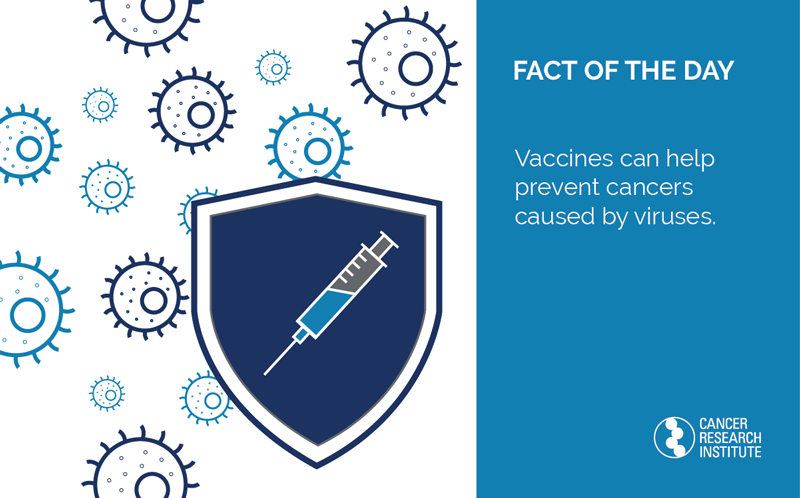Immunotherapy Fact of the Day #10:
Vaccines can help prevent cancers caused by viruses.

Viruses can cause cancer
Certain viruses can trigger genetic mutations that lead to cancer. The first virus to cause cancer in humans wasn’t identified until the 1960s, when Lloyd J. Old, M.D., and Georg Klein, M.D., D.Sc., helped characterize the link between Epstein-Barr virus (EBV) and certain cancers (nasopharyngeal cancer, certain types of lymphomas, and stomach cancer).
Many other viruses are now known to contribute to cancer in humans, including the human papillomavirus or HPV (associated with cervical cancer and head and neck cancer) and hepatitis B virus or HBV (associated with liver cancer). A connection between HIV (human immunodeficiency virus) and Kaposi’s sarcoma was identified by Bijan Safai, M.D., D.Sc., who also aided in HIV’s initial identification. Other viruses associated with cancer include human T-lymphotropic virus, hepatitis C (HCV) virus, and Merkel cell polyomavirus.
Vaccines can help prevent cancers caused by these viruses. Vaccines do not cause cancer.
Learn more about the causes of cancer
How do vaccines prevent cancer?
Viruses work—and contribute to cancer—by sneakily inserting their genes into our DNA, which can disrupt and de-regulate the genetic activity of our cells and cause them to grow in inappropriate ways. Fortunately, vaccines have been developed that can prepare our immune systems against certain infections and therefore help protect us against the cancers that they can cause. Already, approved vaccines are available against HBV and some strains of HPV, which can help protect against liver cancer and several other types of cancer, respectively. In addition to preventive vaccines, scientists and physicians are researching therapeutic vaccines that can be used to treat cancer.
Learn more about cancer vaccines
Harnessing the Power of the Immune System
Understanding the power of the immune system has allowed us to create vaccines that prevent cancer and other cancer treatments that use the body’s own immune system to control and eliminate cancerous cells, known as immunotherapy. Your support of the Cancer Research Institute directly impacts cancer immunotherapy research and the development of vaccines to treat and prevent cancer. You can donate today to CRI to support more breakthroughs and save more lives, or explore other ways to join our cause.
With your support, the Cancer Research Institute can, in turn, fund doctors and scientists leading immunology research and working to develop immunotherapy as a cure for all cancers. The following CRI-funded scientists are working to better understand how our immune system works to combat viruses, in addition to developing strategies that can improve the effectiveness of vaccination against certain cancer-causing viruses:
- Using a viral model called LCMV, Mohamed Abdel Hakeem, Ph.D., is exploring epigenetic patterns associated with immune cell exhaustion that might suggest ways to prevent and reverse it.
- Sadeem Ahmad, Ph.D., is investigating which RNAs turn on MDA5, an immune receptor that recognizes and responds to viral infections and tumor cells.
- Jonathan M. Clingan, Ph.D., is investigating how the OAS-RNase L pathway, which may sense a cancer-causing virus infection, enhances or dampens the immune response.
- William H. Hudson, Ph.D., is looking at how long non-coding RNAs regulate gene expression during T cell development and during responses to viral infection.
- Tuo Li, Ph.D., identified a switch on the protein that produces cGAMP, a DNA sensing system that can alert the immune system and would be beneficial in a cancer vaccine.
Discover different aspects of the science, history, development, and impact of cancer immunotherapy with 30 facts about immunotherapy, presented as part of our fifth annual Cancer Immunotherapy Month.
Stay up-to-date with the latest in cancer immunotherapy news by signing up for our e-newsletter.
Image credit: Cancer Research Institute